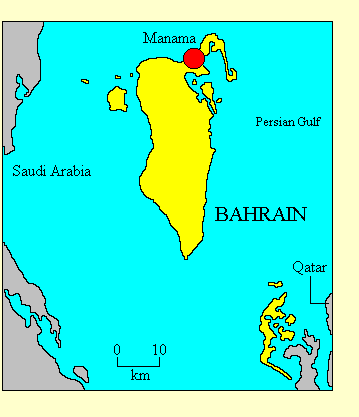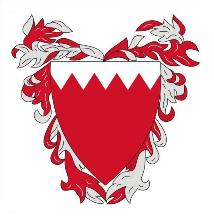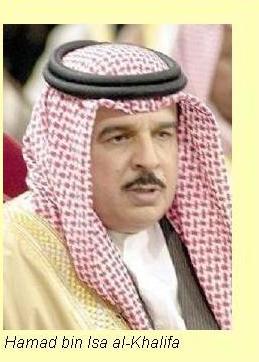

KINGDOM OF BAHRAIN
• Official name: Mamlakat al Bahrayn (Kingdom of Bahrain)
• Location: Middle East
• International organisations: The Arab League, The Non-Aligned Movement, The Organisation of Islamic Conference,
The Organisation of Petroleum Exporting Countries, The United Nations
• Borders: None
• Coastline: Persian Gulf
• Land area: 665 Km2
• Population: 700,000
• Annual GDP (PPP) per capita: US$38,400 (2009 CIA estimate). World ranking: 18
• Ethnicity: Only about 60% of the population are Bahraini Arabs. Another 10% are
Arabs from other countries. Nearly 20% are Pakistanis and Indians, while about 10% are
Iranians.
• Languages: Arabic is the official language and is spoken by the Bahraini and other Arabs.
Farsi is the most widely used minority language. Indian languages and Filipino are also
spoken.
• Religion: Islam is the state religion, and the religion of nearly all the Bahreini and
other Arabs. About two-thirds are Shi'a and one-third Sunni. There are small Christian
and Hindu minorities.
• Form of government: Semi-constitutional monarchy. Bahrain is divided into
twelve municipalities.
• Capital: al-Manama
• Constitution: The new Constitution of the Kingdom of Bahrain came
into effect on 14 February 2002.
• Head of state: King Hamad bin Isa al-Khalifa
came to the throne on 6 March 1999.
• Head of government: The Prime Minister, appointed by the King. In theory the Prime
Minister is accountable to the legislature, but since the Prime Minister is also the Crown Prince, he in fact holds office at the King's pleasure.
• Legislature: Bahrain has a bicameral legislature, the National Assembly (Majlis
al-Watani). The Chamber of Deputies (Majlis al-Nuwwab) consists of 40 members elected
for four-year terms from multi-member constituencies. The Consultative Council (Majlis
al-Shura) consists of 40 members appointed by the King.
• Electoral authority: The government conducts national elections.
• Freedom House 2011 rating: Political Rights 6, Civil Liberties 5
• Transparency International Corruption Index: 49% (48 of 178 countries rated)
• Reporters Without Borders Press Freedom 2010 Index: 48.5% (144 of 178 countries rated)
• Heritage Foundation Economic Freedom 2010 Index: 77.7% (10 of 178 countries rated)
Political history
The Emirate of Bahrain was established in 1783, when the al-Khalifa family expelled
the Persians. In 1861 the British established control of the Gulf
coast and Bahrain signed a Perpetual Truce of Peace and Friendship which made it in
effect a British protectorate. The discovery of oil in the 1930s made Bahrain wealthy.

The British withdrew in 1971 and Bahrein regained its independence, but it has
remained closely aligned to the West. The 1971 constitution made Bahrein a constitutional
monarchy, but in 1975 Sheikh Isa disbanded the National Assembly and ruled alone.
The Shi'ite majority became restive after the Iranian revolution of 1979 and during the
1980s and 1990s there was a cycle of dissent and repression.
Sheikh Hamad succeeded his father in 1998 and immediately embarked on a liberalisation
program (he also promoted himself from Emir to King). A new constitution was drafted and
approved by referendum, and a new legislature elected in 2002, but government remains firmly in the hands of the royal family.
Political expression is reasonably free for male Bahraini citizens, although the
large guest-worker population have no political rights. Political
parties are illegal, but the Islamic National Accord Association (Al Wefaq) serves as an
unofficial party representing the Shi'a population, and was the largest grouping in the
legislature until the events of 2011. The National Democratic Action Society (Wa'ad)
is a leftist party.
The "Arab Spring" in Tunisia and Egypt in early 2011 inpired an uprising by the Shi'a majority, which was suppressed only with
the assistance of Saudi troops, amid much bloodshed. All the Al Wefaq members resigned their seats in the legislature in
protest. When by-elections were held in September to replace them, Al Wefaq boycotted the polls, and turnout was reported
at 20%.
Freedom House's 2011 report on Bahrein says:
"Bahrain is not an electoral democracy. The 2002 constitution gives the king power over the executive, legislative, and judicial
authorities... While formal political parties are illegal, the government allows political societies or groupings to operate...
Freedom of expression is restricted, and the authorities routinely harass activists who criticize them publicly. The government
owns all broadcast media outlets, and the private owners of the three main newspapers have close ties to the government...
Citizens must obtain a license to hold demonstrations, which are banned from sunrise to sunset in any public arena...
The king appoints all judges, and courts have been subject to government pressure. Members of the royal family hold all
security-related offices... Shi'ites are under-represented in government and face various forms of discrimination."
Updated October 2011
|

